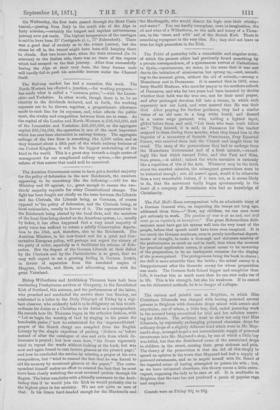The Tablet of yesterday tells a remarkable and singular story,
of which the present editor had previously heard something by a private correspondence, of a spontaneous revival of Catholicism in Syria,—spontaneous, we mean, in the sense that it was not due to the initiation of missionaries, but sprang up,—not, accord- ing to the account given, without the aid of miracle,—among a Mussulman seat in Dasmasous. It is asserted that in 1869, some forty Shadili Moslems, who meet for prayer in the southern suburb of Damascus, and who for two years had been haunted by doubts whether their faith was the true ono, met for their usual prayer, and after prolonged devotion fell into a trance, in which each separately saw our Lord, and were assured that Ile was their God. After praying for further guidance, they had a similar vision of an old man in a long white beard, and dressed in a coarse serge garment, who, holding a lighted taper, glided before them, and said, "Let those who want truth follow me." They hunted, it is said, in Damascus for this teacher assigned to them during three months, when they found him in the Superior of a monastery of Spanish Franciscans, Fray Emanuel Forner, who received them into the Church and taught them its creed. Tho story of the persecutions they had to undergo from the Mussulman Government and of a fresh miracle,—exceed- ingly like that which rescued Peter, and also Paul and Silas, from prison,—is added ; indeed the whole narrative is curiously like a repetition of bits of the Acts. Whatever may be the truth about the asserted miracles, the subsequent persecutions seem to be historical enough ; nor, all marvel apart, would it be otherwise than a very remarkable history, if it turn out, as it seems likely to do, that the movement really began spontaneously in the heart of, a company of Mussulmans who had no knowledge of Christianity.






























 Previous page
Previous page